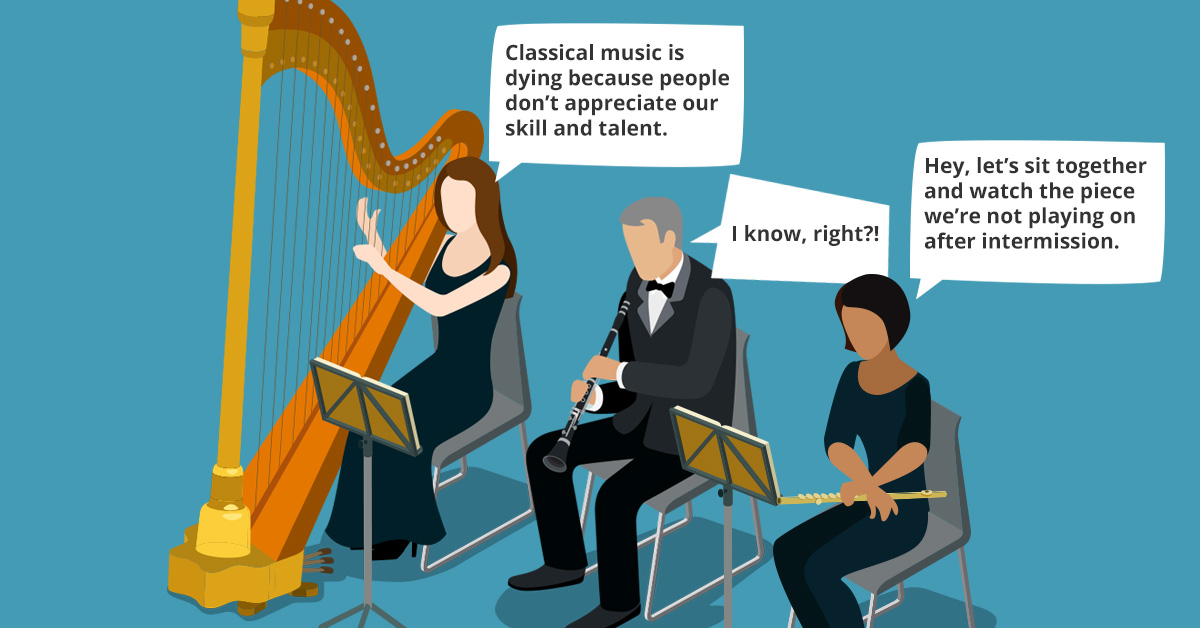An article by Daniel Braden in the 2/11/18 edition of the Morning Call examines how recent changes in the US tax code will have a decidedly negative impact on orchestra musicians classified as employees (as opposed to self employed contractors).
The author is a former tax consultant specializing in serving musicians and according to his analysis of the new laws, employee classified musicians are going to lose the ability to deduct work related expenses.
Like independent contractors, [employee orchestra musicians] must furnish their own equipment and supplies, do much of the work on their own time, and show up with their part of the project prepared and ready to go.
The Concern
 Flowing beneath the river of discussions about why orchestra musicians are required to purchase and maintain their work-related equipment, is an undertow of dynamic consequences.
Flowing beneath the river of discussions about why orchestra musicians are required to purchase and maintain their work-related equipment, is an undertow of dynamic consequences.
One of the most pressing is how this change in tax code impacts governance.
Having the ability to deduct work related expenses has been a convenient pressure valve for both employer and employees to keep what would otherwise become a contentious labor issue under control.
The resulting void risks being filled by executive leaders who are subsequently measured by their position on how, or even if, these work-related expenses are covered by the employer.
Here’s where this becomes problematic.
Since the economic downturn, orchestra governance has been increasingly defined by executive and board leaders who adopt extreme positions on employer/employee related issues. It’s a leading reason we’ve seen an increase in both the frequency and voracity of labor disputes.
Formalizing positions on this topic without the benefit of a broad-based peer examination risks having decisions driven by the same sort of ideological positions that contribute to some of our worst-case examples of a toxic labor environment.
Historical Perspective
Although some professional orchestras do provide musician employees with some form of instrument purchase and/or maintenance compensation, they are decidedly an exception to the rule. Instead, this issue is more commonly addressed via musicians that negotiate individual agreements, such as section principals and fixed seat musicians (such as Fourth Horn or Second Bassoon).
Within this arena, you’ll find most executive leaders fall into two camps: those who agree that some form of compensation is due for instrument purchase/maintenance and those who don’t.
It’s been more than a decade since I’ve encountered an executive who changed his/her mind on this point during an individual agreement negotiation.
Among executives who adopt positions against this form of compensation, I’ve seen some who simply refuse the term outright but there are others who openly laugh at the concept. In 2015, I encountered one executive who told the musicians “if you don’t like it, you should have gone into a different line of work.”
On the other end of the spectrum, I’ve seen executive leaders acknowledge the financial burden these costs deliver and include some form of compensation in their initial offer.
In those scenarios, it’s common to see the deductibility point enter the discussion.
One hallmark of executive leaders approaching this topic with sincere thoughtfulness are those who require the musician employee to produce documentation of annual expenses, agree on the financial benefit of those expenses as deductions, then use the difference as a way to shape final compensation terms.
Dynamic Impact
Traditionally, this has been one of those topics that flies under the radar in that it isn’t something administrative executive discuss in public forums.
Barring any sort of concerted effort to learn more about this issue, board leaders often have positions influenced by political ideology.
Granted, the tangible economic impact this issue has on an orchestra’s expense structure is profound. Even those espousing that as the employer, there is a responsibility to cover some of these costs, there’s a clear acknowledgement that subsidizing 100 percent over the of those expenses would bankrupt most organizations if they attempted to onboard everything over the course of a single season.
At the same time, these costs are equally profound on musician employees.
For them, the loss of deductible work-related expenses risks forcing this to the forefront.
As musician begin feeling that impact on their bottom line (give it no less than one year) and encountering a new form of entrenched thinking, you can expect that frustration to manifest into behaviors that ultimately contribute to facilitating an environment of increased labor hostility.
In response, there is an equal amount of risk with board leaders using this issue as a litmus test when hiring new executives.
It is difficult to see where the result would be anything other than favoring executive administrators that adopt a “no way we pay” position.
Moving Forward
However tempting a wait-and-see approach may seem, the field could do itself a favor by addressing this issue with the attention it deserves. A good place to begin is introducing it as moderated panel discussions during the following annual conferences:
- June: League of American Orchestras (how fortunate for them their June conference is right here in my home city #convenient).
- June: Opera America
- August: International Conference of Symphony and Opera Musicians (ICSOM)
- August: Regional Orchestra Players’ Association (ROPA)
Doing so now could go a long way toward defusing future tensions and demonstrating the value of common interest driven cooperation.


